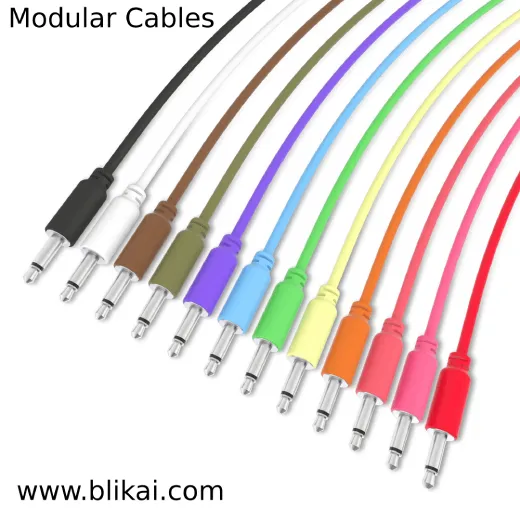Modular Cables: Types, Advantages & Applications
What are Modular Cables?
A cable that's intended to have exchangeable corridor or connectors is appertained to as modular. As a result, users can conform the configuration to suit their own conditions and operations. These cables are easy to assemble, disassemble, and reconfigure without specialized tools thanks to their modular armature.

Types of Modular Cables
Power Cables
To provide appliances and other equipment with electricity, electrical cables are necessary. They are made to meet various power requirements and are available in various combinations. Typically, these cables feature connections like NEMA for residential and commercial use, IEC C7/C8 for small appliances, and IEC C13/C14 for desktop PCs and servers. A safe and dependable power supply is largely dependent on cabling. Everything is supported, including industrial machinery and personal electronics.
Data Cables
Data cables facilitate the transmission of digital data between devices. They include:
- Ethernet Cables
- USB Cables
- HDMI Cables

Audio/Video Cables
Audio/videotape cables are used to transmit audio and videotape signals between bias. They include:
- RCA Cables: An analog cable used to transport compound audio and videotape signals is called an RCA cable, occasionally appertained to as a phono cable. bias like audio receivers, game consoles, and DVD players are constantly connected with it.
- Optical Audio Cables: An optic audio cable, occasionally appertained to as a TOSLINK or SPDIF cable, uses light beats to transfer digital audio. To transfer high-quality audio, it is perfect for connecting audio devices including game consoles, AV receivers, and sound bars.
- DisplayPort Cables: The main applications for DisplayPort connections are the transmission of audio and video information between computers and monitors. It is appropriate for professional applications, gaming, and video editing because it has high resolution and refresh rate support.
Specialty Cables
Tailored modular cables address certain requirements and uses, such as:
- Custom Modular Cables: These cables are made specifically for uses and setups for which store-bought options might not be enough. They are frequently found in specialized machinery and specially designed systems.
- Industrial and Commercial Use Cases: Modular cables are extensively utilized in robotics, telecommunications infrastructure, industrial automation, and commercial applications. This is the point at which scalable and dependable connectivity options are essential. They enable efficient communication and power distribution in demanding environments.
Advantages of Modular Cables
Flexibility and Customization
Modular cables offer exceptional flexibility and customization options, making them highly adaptable to various setups and requirements:
- Easy to Modify and Adapt: Modular cables are easily rearranged or modified by users to suit layout modifications or changes in equipment configuration.
- Suitable for Different Setups and Requirements: Whether for complicated data centers, industrial use, or domestic use To meet individual needs, modular cables are offered in a variety of types, lengths, and connector configurations.
Ease of Maintenance
Modular cables streamline maintenance processes, minimizing downtime and optimizing system reliability:
- Simplified Troubleshooting: Finding and replacing broken wires is simple thanks to the modular design, which keeps the system functioning as a whole. Eliminate complexity and time spent troubleshooting.
- Quick Replacements and Upgrades: Modular wires facilitate quick component replacement or upgrade. Encourage the smooth assimilation of new technology and equipment.
Cost-Effectiveness
Modular cables contribute to long-term cost savings and sustainability efforts:
- Long-Term Savings: Thus, modular cables prolong the life of current infrastructure by enabling simple upgrades and reconfigurations. lowers the expense and requirement for frequent replacement.
- Reduced Waste and New Purchases: Reusable, modular parts cut down on waste and lessen the effect that discarding electronic equipment has on the environment. This is consistent with environmentally friendly methods of deploying technology.
Improved Cable Management
Efficient cable management enhances operational efficiency and system performance:
- Neater and Organized Setups: Because modular cables cut down on clutter and extra cable length, they help keep the installation organized. Enhance with style and low upkeep.
- Enhanced Airflow and Reduced Clutter: Better ventilation is achieved within equipment racks and cabinets with a well-organized cable structure. Prevent overheating and extend the lifespan and efficiency of your equipment.
How Modular Cables Work?
Modular cables work based on their design that allows for interchangeable components, providing flexibility and customization in connectivity solutions. Here’s a general overview of how modular cables work:
Modular Connectors:
Connectors on modular cables are readily plugged into and unplugged from the cable itself. These connectors may be connected into the appropriate ports or sockets because they typically use a standardized interface or connector.
Interchangeable Components:
Because these cables are modular, individual parts like connectors, jacks, and adapters can be changed out as needed. Because the components are interchangeable, customers can mix and match them to create unique cable configurations that suit their needs.
Assembly and Disassembly:
The standard procedure for assembling a modular cable is to slide the connections into the cable body and fasten them with screws or a locking mechanism. Depending on how it is designed. It is easy to disassemble. enables fast modification or repair without the need for specialized tools.
Applications of Modular Cables
Consumer Electronics
Consumer gadgets frequently employ modular wires. It contributes to greater flexibility and connectedness in a range of applications:
- Home Entertainment Systems: TVs, game consoles, speakers, and multimedia players may all be seamlessly integrated with audio/video components thanks to modular cables. facilitates the installation and reconfiguration of home entertainment systems and supports high-resolution transmissions.
- Personal Computing Setups: Individual Computer When it comes to connecting peripherals like printers, external storage devices, keyboards, mouse, and displays, modular cables are essential. suitable with both laptops and desktop PCs By using various cable kinds and lengths, users can personalize their settings. Maximize efficiency and organization in the workstation.
Professional and Commercial Use
In professional and commercial environments, modular cables offer robust solutions for efficient connectivity and infrastructure management:
- Office Environments: Modular cables provide reliable networking solutions in office settings, supporting data transmission between computers, printers, servers, and other office equipment. They facilitate scalable network expansions and simplify maintenance tasks, ensuring uninterrupted business operations.
- Data Centers and Server Rooms: Modular cabling plays a major role in data centers' structured cabling systems, which enable scalability and high-speed data transport. Multiple network protocols and standards are supported by modular cabling. In large-scale computing environments, this makes server networking and data administration efficient.
Industrial Applications
In industrial automation and production, modular cables are crucial for increasing operational dependability and efficiency.
- Manufacturing and Production Lines: In settings that are industrial Control panels, sensors, actuators, and machinery are connected by modular cables. enabling automated activities and procedures on manufacturing lines. They ensure that components communicate with one other smoothly and can survive hostile environments. Boost output while cutting down on idle time.
- Robotics and Automation Systems: Modular cables enable flexible integration and control of robotic systems in manufacturing and assembly operations. They support precise data transmission and power distribution, enhancing the agility and performance of industrial robots and automated machinery.
Specialized Fields
Specialized applications in settings needing a strong and dependable connection solution are supported by modular cables:
- Medical Equipment: Diagnostic equipment in healthcare facilities is connected by modular cables. imaging apparatus surgical equipment and patient monitoring systems Assist in guaranteeing precise transfer of data. and enable the smooth integration of medical equipment. This helps to deliver efficient medical care and patient care.
- Military and Aerospace Technology: Applications in flight and the military require modular wires. Radar system communication Strict performance and reliability requirements are met by communications, avionics, and navigation systems. supporting the defense and aerospace sectors' mission-critical activities.
Conclusion
In conclusion, modular connections form the basis of contemporary electronics and technology. They highlight the value of cables in a variety of applications by offering a number of benefits. from industrial automation to consumer electronics. There are several benefits to modular cables' flexibility and adaptability. In essence, modular cables offer more than just a means of connection. Sustainability and adaptability through efficiency harvesting in contemporary electronics and industry. Modular cables will be crucial in determining the global connectivity and creativity of the future as technology develops.
FAQ
1. Can modular cables be reused?
Yes, modular cables can often be reused by replacing or reconfiguring connectors or components. This helps reduce waste and supports sustainability efforts in electronics and technology sectors.
2. What should I consider when choosing modular cables for my application?
When choosing modular cables, consider factors such as:
- Connector Type: Ensure compatibility with your devices and equipment.
- Length and Configuration: Select cables of appropriate lengths and configurations for your setup.
- Performance Requirements: Choose cables that meet the required data transmission speeds and reliability standards for your application.
3. Where can I purchase modular cables?
Purchasing modular cables is possible from electronics retailers like www.blikai.com. online retailer and suppliers with expertise in networking, industrial automation, audio/video, and computers. To guarantee quality and fit for your particular needs, make sure you buy your cable from a reliable source.
Related Articles
What is Firewire Cables? All Explained
The Power of RG11 Coaxial Cable: Advantages and Applications










